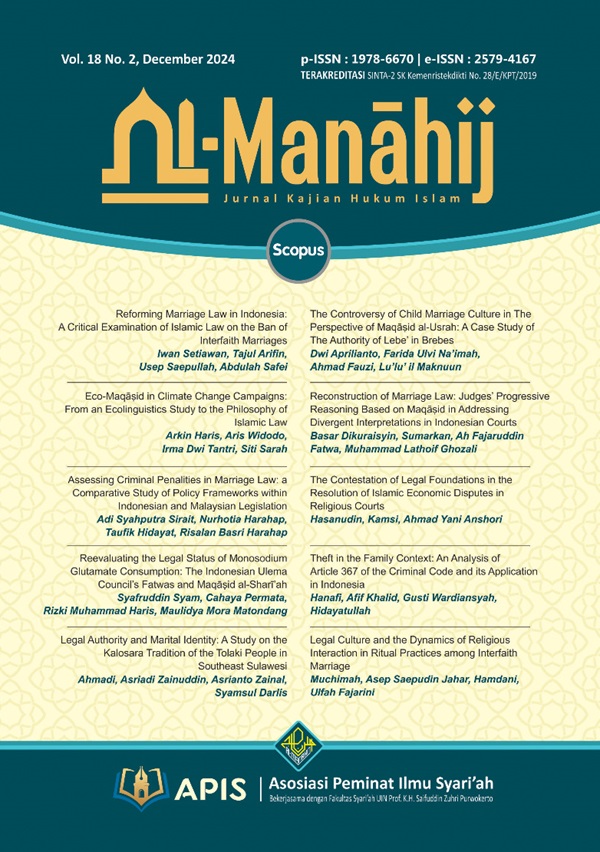Eco-Maqāṣid in Climate Change Campaigns: From an Ecolinguistics Study to the Philosophy of Islamic Law
DOI:
https://doi.org/10.24090/mnh.v18i2.10652Keywords:
Eco-maqasid, Ecolinguistics, Ecosophy, Islamic environmental lawAbstract
This article aims to uncover ‘eco-maqāṣid’, an Islamic legal philosophy related to environmental awareness. Using a multimodality approach, the study begins by understanding the textual and visual meaning of climate change campaigns with Islamic themes on the @greenpeace.id Instagram account. The data were further explored through ecolinguistic studies to reveal The Stories We Live By, Ecological Philosophy (ecosophy), and Maqāṣid al-Sharī’ah. The findings show that the type of story constructed through the representation of the relationship between images and text is predominantly in the category of Salience, highlighting the importance of maqāṣid principles to environmental aspects. The principle of hifz al-nafs supports the promotion of environmental sustainability to protect Muslim health from the impacts of climate change. Hifz al-māl plays a role in the efforts of mitigation and adaptation to the threats of climate change to protect the assets and economic well-being of Muslim communities. Hifz al-nasl is related to the sustainable preservation of Islamic rituals, holidays, and cultural traditions. Meanwhile, hifz al-dīn is reflected in the endeavor to care for the environment as a religious duty manifested from Quranic verses and Hadith. Hifz al-‘aql resonates with strengthening environmental education through Ulama advice and Islamic ethics. Finally, all ḍarūriyyāt al-khams advocates for the protection of all elements in nature. This integration of maqāṣid into ecosophy illustrates how Islamic principles guide environmental management against climate change, creating a framework called ‘eco-maqāṣid’.Downloads
References
Auda, Jasser. “A Maqasid Approach to Contemporary Application of the Shariah,” 2011, 193–217.
———. Maqasid Al-Shariah An Introductory Guide. London: The International Institute of Islamic Thought, 2008.
Bernard, Taryn. “The Discursive Representation of Social Actors in the Corporate Social Responsibility (CSR) and Integrated Annual ( IA ) Reports of Two South African Mining Companies.” Critical Approaches to Discourse Analysis Across Disciplines 10, no. 1 (2018): 81–97.
Chen, Sibo. “Language and Ecology: A Content Analaysis of Ecolinguistics as an Emerging Research Field.” Elsevier Ltd., 2016. https://doi.org/10.1016/j.amper.2016.06.002.
Fuqoha, Fuqoha, Rahmi Mulyasih, Hasuri Hasuri, Indrianti Azhar Firdausi, and Silfi Barten. “Constitutional Rights of Citizen Journalism in Indonesia: From Maqashid Sharia Perspective.” De Jure: Jurnal Hukum Dan Syari'ah; Vol 16, No 1 (2024)DO - 10.18860/j-Fsh.V16i1.26154 , June 30, 2024.
Garrido, Norman. “EL Método de James Spradley En La Investigación Cualitativa TT - O Método Da James Spradley Na Investiga Ção TT - The Method of James Spradley in Qualitative Research.” Universidad de Tarapacá, Chile 6, no. spe (2017): 37–42.
Goatly, Andrew. “Five Themes for Ecostylistics.” Journal of World Languages, 2022. https://doi.org/10.1515/jwl-2022-0026.
Idllalène, Samira. “Rediscovery and Revival in Islamic Environmental Law.” In Rediscovery and Revival in Islamic Environmental Law: Back to the Future of Nature’s Trust, i–i. ASCL Studies in Comparative Law. Cambridge University Press, 2021.
James S. Damico, Mark Baildon and Alexandra Panos. “Climate Justice Literacy: Stories We Live by, Ecolinguistics, and Classroom Practice.” Journal of Adolescent and Adult Literacy, 2020. https://doi.org/10.1002/jaal.1051.
Jismulatif, Dahnilsyah, and Mangatur Sinaga. “An Ecolinguistics Analysis of Indonesian Pop Music Lyrics on Environment:A Review of Two Nature Songs.” Journal of Physics: Conference Series 1655, no. 1 (2020). https://doi.org/10.1088/1742-6596/1655/1/012129.
Leeuwen, Gunther Kress and Theo van. Reading Images, The Grammar of Visual Design. Second. Routledge, 2006.
Leeuwen, Theo van. Discourse and Practice. Oxford University Press, 2008.
LeVasseur, Todd. “Defining ‘Ecolinguistics?’: Challenging Emic Issues in an Evolving Environmental Discipline.” Journal of Environmental Studies and Sciences 5, no. 1 (2015): 21–28. https://doi.org/10.1007/s13412-014-0198-4.
Ma, Chen, and Arran Stibbe. “The Search for New Stories to Live by: A Summary of Ten Ecolinguistics Lectures Delivered by Arran Stibbe.” Journal of World Languages 8, no. 1 (2022): 164–87. https://doi.org/10.1515/jwl-2021-0031.
Marfiyanto, Tri. “Maqasid Syariah Dan Pendekatan Teori Sistem Dalam Hukum Islam Menurut Yasser Auda.” Jurnal Kajian Hukum Islam 6, no. 1 (2019): 1–13. https://doi.org/10.52166/jkhi.v6i1.4.
Meurs, Boris van. “Deep Ecology and Nature: Naess, Spinoza, Schelling.” The Trumpeter 35, no. 1 (2020): 3–21. https://doi.org/10.7202/1068481ar.
Michele Zappavigna. “Michele Zappavigna-Discourse of Twitter and Social Media_ How We Use Language to Create Affiliation on the Web-Continuum (2012),” 2012.
Murti, Ari, and Toufan Aldian Syah. “Menelaah Pemikiran Jasser Auda Dalam Memahami Maqasid Syariah.” Citizen : Jurnal Ilmiah Multidisiplin Indonesia 1, no. 2 (2021): 60–67. https://doi.org/10.53866/jimi.v1i2.9.
Naess, Arne. “The Deep Ecology Movement.” Problems Of International Justice, no. 1979 (2019): 144–48. https://doi.org/10.4324/9780429303111-9.
Pavo, Raymundo R. “Arne Naess’ Ecosophy T: Its Norms, Hypotheses and Systematization.” Social Ethics Society Journal of Applied Philosophy 4, no. 2 (2018).
Polajnar, Janja. “Verbal and Multimodal Metaphorical Patterns in Wikipedia Migration Discourse.” XLinguae 14, no. 2 (2021): 185–206. https://doi.org/10.18355/XL.2021.14.02.14.
Pratama, Herdifa. “Determination of the Poor Mustahiq From Maqasid Shariah Jasser Auda Perspective ( Study After the Decision of Baznas ’ s Chairman Number 33 of 2019 )” 1, no. 33 (2022): 1–18.
Rothenberg, D. “Deep Ecology.” Encyclopedia of Applied Ethics: Volume 1-4, Second Edition 1–4, no. May (2012): 738–44. https://doi.org/10.1016/B978-0-12-373932-2.00352-5.
Salam, Nor, Agus Purnomo, Saifullah Saifullah, and Sirojuddin Ahmad. “Interfaith Marriage from the Perspective of Rationality: Theocentrism in Islamic Law and Anthropocentrism in Human Rights Law.” De Jure: Jurnal Hukum Dan Syari'ah; Vol 16, No 1 (2024)DO - 10.18860/j-Fsh.V16i1.23989 , June 30, 2024.
Sameer, Imad Hayif. “Ideational Aspect of Systemic Functional Grammar in Bush ’ s and Al-Assad ’ s Ideational Aspect of Systemic Functional Grammar in Bush ’ s and Al-Assad ’ s First Inaugural Speech,” no. May (2020).
Sarani, Abdullah, and Somayeh Kord. “A Study of the Representation of Social Actors in Touchstone Series: A Critical Discourse Analysis Perspective.” Teaching English Language 12, no. 1 (2018): 111–33.
Statista. “Share of Indonesian Population in 2023, by Religion,” 2023.
Stibbe, Arran. “Ecolinguistics.” Ecolinguistics, no. May 2015 (2020). https://doi.org/10.4324/9780367855512.
Subakir, Ahmad, Nur Wakhidah, Gusti Muzainah, Sadiani, and Raihanah Abdullah. “Synergy of Samin Culture With Environmental Fiqh in Central Java.” Syariah: Jurnal Hukum Dan Pemikiran 24, no. 1 (2024): 224–40. https://doi.org/10.18592/sjhp.v24i1.13456.
Sukarni, and Hafini Bin Mahmud. “Development and Concept of Environmental Fiqh in the Works of Banjar Scholars: Historical and Thought Analysis.” Syariah: Jurnal Hukum Dan Pemikiran 24, no. 1 (2024): 172–88. https://doi.org/10.18592/sjhp.v24i1.12906.
Syihab, Muhammad Baiquni. “Telaah Kritis Pemikiran Jasser Auda Dalam Buku ‘Maqasid Al-Shariah as Philosophy of Islamic Law: A Systems Approach.’” AN NUR: Jurnal Studi Islam 15, no. 1 (2023): 114–36. https://doi.org/10.37252/annur.v15i1.455.
Vallego, Jorge. “Ecolinguistics and AI : Integrating Eco-Awareness in Natural Language Processing,” 2023, 1–24.
Wu, Yina. “Ecological Discourse Analysis” 181, no. Icsshe (2018): 646–49. https://doi.org/10.2991/icsshe-18.2018.163.
Yaakub, Sabariyah, and Nik Ab Halim Nik Abdullah. “Towards Maqasid Shariah in Sustaining the Environment Through Impactful Strategies.” International Journal of Islamic Business 5, no. 1 (2020): 36–45. https://doi.org/10.32890/ijib2022.5.1.2.
Zhdanava, Alena, Surinderpal Kaur, and Kumaran Rajandran. “Representing Nonhuman Animals as Equals : An Ecolinguistic Analysis of Vegan Campaigns” 7, no. 1 (2021): 26–57.
Downloads
Published
How to Cite
Issue
Section
License
Copyright (c) 2024 Arkin Haris, Aris Widodo, Irma Dwi Tantri, Siti Sarah

This work is licensed under a Creative Commons Attribution-ShareAlike 4.0 International License.
Authors who publish with this journal agree to the following terms:
- Authors retain copyright and grant the journal right of first publication with the work simultaneously licensed under a Creative Commons Attribution License that allows others to share the work with an acknowledgement of the work's authorship and initial publication in this journal.
- Authors are able to enter into separate, additional contractual arrangements for the non-exclusive distribution of the journal's published version of the work (e.g., post it to an institutional repository or publish it in a book), with an acknowledgement of its initial publication in this journal.
- Authors are permitted and encouraged to post their work online (e.g., in institutional repositories or on their website) prior to and during the submission process, as it can lead to productive exchanges, as well as earlier and greater citation of published work (See The Effect of Open Access).


















